



Kerakoll

Emilia-Romagna, Italy
June 2023
Other manufacturing
Manufacturing
Brazil,
France,
Germany,
Greece,
India,
Italy,
Poland,
Portugal,
Spain,
United Arab Emirates,
United Kingdom
Kerakoll, Benefit Company international leader in the sustainable construction sector, offers a comprehensive package of sustainable building materials and services to build and live in respect of the environment and housing well-being. Since 1968 – when the Group was founded in Sassuolo, the heart of the most important ceramic district in the world, thanks to the business initiative of Romano Sghedoni – Kerakoll has undergone a constant growth both on the national and international market for building materials that has taken the company to the forefront of the sustainable building sector and to a level of technological leadership recognized all over the world. Kerakoll has achieved over 600 million euros of turnover in 2021 – of which one third on foreign markets – and has about 2,000 people among employees and associates. As of today, Kerakoll is active in 12 countries with 17 production plants in Italy, Spain, Poland, Greece, France, the United Kingdom, India, Brazil, and Portugal.
Overall B Impact Score
Governance 14.6
Governance evaluates a company's overall mission, engagement around its social/environmental impact, ethics, and transparency. This section also evaluates the ability of a company to protect their mission and formally consider stakeholders in decision making through their corporate structure (e.g. benefit corporation) or corporate governing documents.
Governance 14.6
Governance evaluates a company's overall mission, engagement around its social/environmental impact, ethics, and transparency. This section also evaluates the ability of a company to protect their mission and formally consider stakeholders in decision making through their corporate structure (e.g. benefit corporation) or corporate governing documents.
Workers 24.4
Workers evaluates a company’s contributions to its employees’ financial security, health & safety, wellness, career development, and engagement & satisfaction. In addition, this section recognizes business models designed to benefit workers, such as companies that are at least 40% owned by non-executive employees and those that have workforce development programs to support individuals with barriers to employment.
Community 15.5
Community evaluates a company’s engagement with and impact on the communities in which it operates, hires from, and sources from. Topics include diversity, equity & inclusion, economic impact, civic engagement, charitable giving, and supply chain management. In addition, this section recognizes business models that are designed to address specific community-oriented problems, such as poverty alleviation through fair trade sourcing or distribution via microenterprises, producer cooperative models, locally focused economic development, and formal charitable giving commitments.
Environment 26.1
Environment evaluates a company’s overall environmental management practices as well as its impact on the air, climate, water, land, and biodiversity. This includes the direct impact of a company’s operations and, when applicable its supply chain and distribution channels. This section also recognizes companies with environmentally innovative production processes and those that sell products or services that have a positive environmental impact. Some examples might include products and services that create renewable energy, reduce consumption or waste, conserve land or wildlife, provide less toxic alternatives to the market, or educate people about environmental problems.
Customers 3.6
Customers evaluates a company’s stewardship of its customers through the quality of its products and services, ethical marketing, data privacy and security, and feedback channels. In addition, this section recognizes products or services that are designed to address a particular social problem for or through its customers, such as health or educational products, arts & media products, serving underserved customers/clients, and services that improve the social impact of other businesses or organizations.